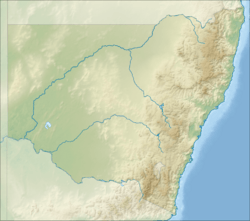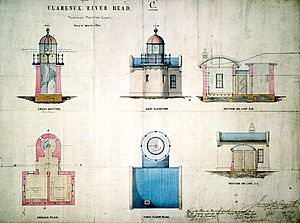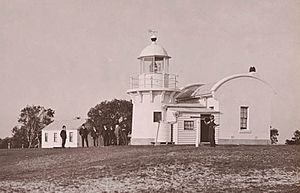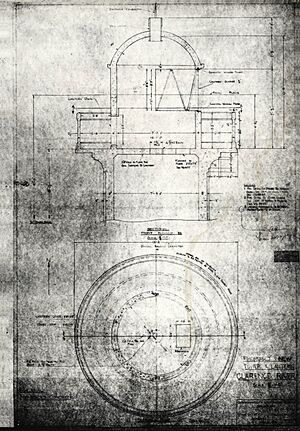Clarence River Light facts for kids
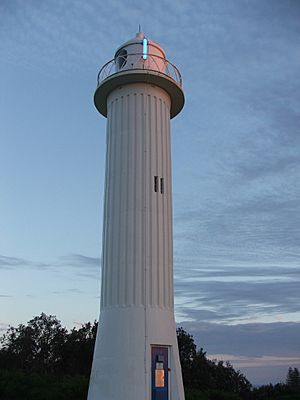 |
|
| Clarence River Lighthouse | |
|
|
|
| Location | Yamba New South Wales Australia |
|---|---|
| Coordinates | 29°25′56.88″S 153°21′50.37″E / 29.4324667°S 153.3639917°E |
| Year first constructed | 1866 (first) |
| Year first lit | 1955 (current) |
| Automated | 1920 |
| Deactivated | 1955 (first) |
| Construction | concrete tower |
| Tower shape | fluted cylindrical tower with balcony and lantern |
| Markings / pattern | white tower and lantern |
| Height | 56 feet (17 m) |
| Focal height | 135 feet (41 m) |
| Intensity | 22,000 candela |
| Range | 16 nmi (30 km; 18 mi) |
| Characteristic | Fl (3) W 15s. F Bu |
| Admiralty number | K2818 |
| NGA number | 111-5920 |
| ARLHS number | AUS-058 |
The Clarence River Light is a working lighthouse in Yamba, Australia. It is also known as the Yamba Light or Clarence Head Light. This important building stands on Pilot Hill, a small hill in Wooli Park. It is located south of the entrance to the Clarence River.
The lighthouse you see today was built in 1955. It replaced an older lighthouse from 1880. This lighthouse helps guide ships safely. It acts as a "rear range light" for two different shipping paths.
Contents
History of the Lighthouse
The First Lighthouse
The very first light on Pilot Hill was likely a simple platform. It had a kerosene lamp to show ships the way. This was around 1866. The first actual building was a small wooden hut. It also used a large kerosene lamp. This hut was built in 1866. It stood where the 1880 lighthouse would later be built. You can see the mast from this old lighthouse at the Story House Museum in Yamba.
In 1878, plans were made for a stronger, permanent lighthouse. This lighthouse was one of five similar designs. They were all designed by a famous architect named James Barnet. The other four lighthouses were Fingal Head Light, Crowdy Head Light, Tacking Point Lighthouse, and Richmond River Light.
The Clarence River Light was built by W. Kinnear. It cost £1,097 to build. Construction finished in 1880. Like the other four lighthouses, it was not very tall, about 7 meters (23 feet) high. It had a covered entrance area that connected to a small side building. Ships could see its light from about 6 nautical miles (11 kilometers) away. A home for the lighthouse keeper was also built nearby.
In 1920, the lighthouse became automated. This meant it could run by itself. So, a lighthouse keeper was no longer needed to live there.
By 1934, a new hotel called the Pacific Hotel was built in Yamba. This building partly blocked the lighthouse's light. Also, a water reservoir was planned for the same spot. Because of these reasons, a new lighthouse was built in 1955. The old lighthouse was taken down in 1956.
Bringing the Old Lighthouse Back
After the water reservoir was removed in 1980, people wanted to rebuild the old lighthouse. They tried to get money from the government. But they could not raise enough funds. So, local volunteers decided to pay for it themselves. They built a copy of the old lighthouse. However, it did not have the light part (the lantern). This new building now houses the Yamba Community Radio Station 2TLC.
In 2009, a new project started. The goal was to fully restore the replica lighthouse. Many local people and businesses helped. By November 2011, the project was almost done. They installed a lantern and an original 19th-century Fresnel lens. This special lens was given to them by the Australian Maritime Safety Authority (AMSA).
The Current Lighthouse
The lighthouse you see today was built in 1955. It is made of concrete and has a modern design. The lighting equipment from the old lighthouse was moved into this new one.
Today, the light comes from a special beacon. It uses a 12 Volt 75 Watt quartz halogen lamp. This light is very bright, about 22,000 cd. It can be seen by ships up to 16 nautical miles (30 kilometers) away. The lighthouse gets its power from the mains electricity. It also has a battery system as a backup.
The light has a special pattern, called its characteristic. It flashes white three times every 15 seconds. This helps sailors know which lighthouse they are seeing. It also shows a steady blue light. This blue light helps guide ships through the North Channel.
Visiting the Lighthouse
The Australian Maritime Safety Authority operates the light. The land around the lighthouse is managed by the New South Wales Department of Lands. You can visit the lighthouse grounds. They are open to the public. There is also parking available nearby. However, the lighthouse tower itself is usually closed to visitors.
 | Delilah Pierce |
 | Gordon Parks |
 | Augusta Savage |
 | Charles Ethan Porter |


